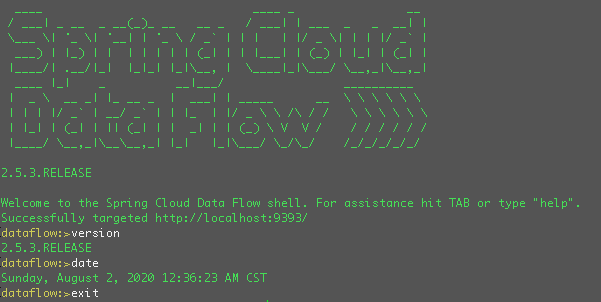Spring Cloud Data Flow用Shell来操作,方便建立CICD
1 前言
欢迎访问南瓜慢说 www.pkslow.com获取更多精彩文章!
之前我们用两篇文章讲解了Spring Cloud Data Flow,例子都是用UI操作的,但我们在Linux系统上经常是无法提供界面来操作,集成在Jenkins上也无法使用UI。好在官方提供了Data Flow Shell工具,可以在命令行模式下进行操作,非常方便。
相关文章可参考:
Spring Cloud Data Flow初体验,以Local模式运行
把Spring Cloud Data Flow部署在Kubernetes上,再跑个任务试试
Spring Cloud Data Flow Server提供了可操作的REST API,所以这个Shell工具的本质还是通过调用REST API来交互的。
2 常用操作
2.1 启动
首先要确保我们已经安装有Java环境和下载了可执行的jar包:spring-cloud-dataflow-shell-2.5.3.RELEASE.jar
然后启动如下:
$ java -jar spring-cloud-dataflow-shell-2.5.3.RELEASE.jar

默认是连接了http://localhost:9393的Server,可以通过--dataflow.uri=地址来指定。如果需要认证信息,需要加上--dataflow.username=用户 --dataflow.password=密码。
比如我们连接之前安装在Kubernetes上的Server如下:
$ java -jar spring-cloud-dataflow-shell-2.5.3.RELEASE.jar --dataflow.uri=http://localhost:30093
2.2 Application操作
介绍一下Application相关操作:
列出所有目前注册的app:
dataflow:>app list
╔═══╤══════╤═════════╤════╤════════════════════╗
║app│source│processor│sink│ task ║
╠═══╪══════╪═════════╪════╪════════════════════╣
║ │ │ │ │composed-task-runner║
║ │ │ │ │timestamp-batch ║
║ │ │ │ │timestamp ║
╚═══╧══════╧═════════╧════╧════════════════════╝
查看某个app的信息:
dataflow:>app info --type task timestamp
清除app注册信息:
dataflow:>app unregister --type task timestamp
Successfully unregistered application 'timestamp' with type 'task'.
清除所有app注册信息:
dataflow:>app all unregister
Successfully unregistered applications.
dataflow:>app list
No registered apps.
You can register new apps with the 'app register' and 'app import' commands.
注册一个app:
dataflow:>app register --name timestamp-pkslow --type task --uri docker:springcloudtask/timestamp-task:2.1.1.RELEASE
Successfully registered application 'task:timestamp-pkslow'
dataflow:>app list
╔═══╤══════╤═════════╤════╤════════════════╗
║app│source│processor│sink│ task ║
╠═══╪══════╪═════════╪════╪════════════════╣
║ │ │ │ │timestamp-pkslow║
╚═══╧══════╧═════════╧════╧════════════════╝
批量导入app,可以从一个URL或一个properties文件导入:
dataflow:>app import https://dataflow.spring.io/task-docker-latest
Successfully registered 3 applications from [task.composed-task-runner, task.timestamp.metadata, task.composed-task-runner.metadata, task.timestamp-batch.metadata, task.timestamp-batch, task.timestamp]
需要注意的是,在注册或导入app时,如果重复的话,默认是无法导入的,不会覆盖。如果想要覆盖,可以加参数--force。
dataflow:>app register --name timestamp-pkslow --type task --uri docker:springcloudtask/timestamp-task:2.1.1.RELEASE
Command failed org.springframework.cloud.dataflow.rest.client.DataFlowClientException: The 'task:timestamp-pkslow' application is already registered as docker:springcloudtask/timestamp-task:2.1.1.RELEASE
The 'task:timestamp-pkslow' application is already registered as docker:springcloudtask/timestamp-task:2.1.1.RELEASE
dataflow:>app register --name timestamp-pkslow --type task --uri docker:springcloudtask/timestamp-task:2.1.1.RELEASE --force
Successfully registered application 'task:timestamp-pkslow'
2.3 Task操作
列出task:
dataflow:>task list
╔════════════════╤════════════════════════════════╤═══════════╤═══════════╗
║ Task Name │ Task Definition │description│Task Status║
╠════════════════╪════════════════════════════════╪═══════════╪═══════════╣
║timestamp-pkslow│timestamp │ │COMPLETE ║
║timestamp-two │<t1: timestamp || t2: timestamp>│ │ERROR ║
║timestamp-two-t1│timestamp │ │COMPLETE ║
║timestamp-two-t2│timestamp │ │COMPLETE ║
╚════════════════╧════════════════════════════════╧═══════════╧═══════════╝
删除一个task,这里我们删除的是一个组合task,所以会把子task也一并删除了:
dataflow:>task destroy timestamp-two
Destroyed task 'timestamp-two'
删除所有task,会有风险提示:
dataflow:>task all destroy
Really destroy all tasks? [y, n]: y
All tasks destroyed
dataflow:>task list
╔═════════╤═══════════════╤═══════════╤═══════════╗
║Task Name│Task Definition│description│Task Status║
╚═════════╧═══════════════╧═══════════╧═══════════╝
创建一个task:
dataflow:>task create timestamp-pkslow-t1 --definition "timestamp --format=\"yyyy\"" --description "pkslow timestamp task"
Created new task 'timestamp-pkslow-t1'
启动一个task并查看状态,启动时需要记录执行ID,然后通过执行ID来查询状态:
dataflow:>task launch timestamp-pkslow-t1
Launched task 'timestamp-pkslow-t1' with execution id 8
dataflow:>task execution status 8
查看所有task执行并查看执行日志:
dataflow:>task execution list
dataflow:>task execution log 8
. ____ _ __ _ _
/\\ / ___'_ __ _ _(_)_ __ __ _ \ \ \ \
( ( )\___ | '_ | '_| | '_ \/ _` | \ \ \ \
\\/ ___)| |_)| | | | | || (_| | ) ) ) )
' |____| .__|_| |_|_| |_\__, | / / / /
=========|_|==============|___/=/_/_/_/
:: Spring Boot :: (v2.1.13.RELEASE)
2020-08-01 17:20:51.626 INFO 1 --- [ Thread-5] com.zaxxer.hikari.HikariDataSource : HikariPool-1 - Shutdown initiated...
2020-08-01 17:20:51.633 INFO 1 --- [ Thread-5] com.zaxxer.hikari.HikariDataSource : HikariPool-1 - Shutdown completed.
2.4 Http请求
可以进行http请求:
dataflow:>http get https://www.pkslow.com
dataflow:>http post --target https://www.pkslow.com --data "data"
> POST (text/plain) https://www.pkslow.com data
> 405 METHOD_NOT_ALLOWED
Error sending data 'data' to 'https://www.pkslow.com'
2.5 读取并执行文件
先准备一个脚本文件,用来放Data Flow Shell命令,文件名为pkslow.shell,内容如下:
version
date
app list
执行与结果如下:
dataflow:>script pkslow.shell
version
2.5.3.RELEASE
date
Sunday, August 2, 2020 1:59:34 AM CST
app list
╔═══╤══════╤═════════╤════╤════════════════════╗
║app│source│processor│sink│ task ║
╠═══╪══════╪═════════╪════╪════════════════════╣
║ │ │ │ │timestamp-pkslow ║
║ │ │ │ │composed-task-runner║
║ │ │ │ │timestamp-batch ║
║ │ │ │ │timestamp ║
╚═══╧══════╧═════════╧════╧════════════════════╝
Script required 0.045 seconds to execute
dataflow:>
但其实我们在CI/CD的pipeline中,并不想先启动一个shell命令行,然后再执行一个脚本。我们想一步到位,直接执行,执行完毕后退出shell命令行。这也是有办法的,可以在启动的时候通过 --spring.shell.commandFile指定文件,如果有多个文件则用逗号,分隔。如下所示:
$ java -jar spring-cloud-dataflow-shell-2.5.3.RELEASE.jar --dataflow.uri=http://localhost:30093 --spring.shell.commandFile=pkslow.shell
Successfully targeted http://localhost:30093
2020-08-02T02:03:49+0800 INFO main o.s.c.d.s.DataflowJLineShellComponent:311 - 2.5.3.RELEASE
2020-08-02T02:03:49+0800 INFO main o.s.c.d.s.DataflowJLineShellComponent:311 - Sunday, August 2, 2020 2:03:49 AM CST
2020-08-02T02:03:49+0800 INFO main o.s.c.d.s.DataflowJLineShellComponent:309 -
╔═══╤══════╤═════════╤════╤════════════════════╗
║app│source│processor│sink│ task ║
╠═══╪══════╪═════════╪════╪════════════════════╣
║ │ │ │ │timestamp-pkslow ║
║ │ │ │ │composed-task-runner║
║ │ │ │ │timestamp-batch ║
║ │ │ │ │timestamp ║
╚═══╧══════╧═════════╧════╧════════════════════╝
$
执行完毕后,不会在shell命令行模式里,而是退回linux的终端。这正是我们所需要的。
我们来准备一个注册应用——创建任务——执行任务的脚本试试:
version
date
app register --name pkslow-app-1 --type task --uri docker:springcloudtask/timestamp-task:2.1.1.RELEASE
task create pkslow-task-1 --definition "pkslow-app-1"
task launch pkslow-task-1
执行与结果如下:
$ java -jar spring-cloud-dataflow-shell-2.5.3.RELEASE.jar --dataflow.uri=http://localhost:30093 --spring.shell.commandFile=pkslow.shell
Successfully targeted http://localhost:30093
2020-08-02T02:06:41+0800 INFO main o.s.c.d.s.DataflowJLineShellComponent:311 - 2.5.3.RELEASE
2020-08-02T02:06:41+0800 INFO main o.s.c.d.s.DataflowJLineShellComponent:311 - Sunday, August 2, 2020 2:06:41 AM CST
2020-08-02T02:06:41+0800 INFO main o.s.c.d.s.DataflowJLineShellComponent:311 - Successfully registered application 'task:pkslow-app-1'
2020-08-02T02:06:42+0800 INFO main o.s.c.d.s.DataflowJLineShellComponent:311 - Created new task 'pkslow-task-1'
2020-08-02T02:06:51+0800 INFO main o.s.c.d.s.DataflowJLineShellComponent:311 - Launched task 'pkslow-task-1' with execution id 9
这样,我们就可以实现自动化打包与部署运行了。
3 一些使用技巧
强大的shell工具提供了许多命令,其实不用一一记住,可以通过help命令查看所有命令:
dataflow:>help
如果只对特定的一类命令感兴趣,可以通过help xxx的方式获取帮助:
dataflow:>help version
* version - Displays shell version
dataflow:>help app
* app all unregister - Unregister all applications
* app default - Change the default application version
* app import - Register all applications listed in a properties file
* app info - Get information about an application
* app list - List all registered applications
* app register - Register a new application
* app unregister - Unregister an application
shell还支持tab键补全命令。
4 总结
本文的命令比较多,不想造成冗长,部分执行结果就不贴出来了,原文可到官网参考。
欢迎关注微信公众号<南瓜慢说>,将持续为你更新...

多读书,多分享;多写作,多整理。



